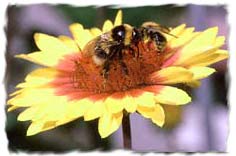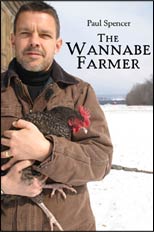Plan Bee
I've ordered the bees (a three-pound package containing 11,000 honey bees and a queen), I'm almost done painting the hive (just one coat to go), I've prepped the site (over by the raspberry bushes), and now I just wait for a call from Tom, down at the post office, saying, “I have a package for you, and it's buzzing.” That's supposed to happen next week, which would probably be too late if I were a real farmer (such a late start will mean a low honey harvest). But since I'm a Wannabe Farmer it really doesn't matter when I start the hive.
 |
Yes, I've come late to beekeeping, in
more ways than one. Actually, this was my wife's idea, not mine. She's
been talking up the benefits of honey bees in the garden for some time
now. Part of my reluctance was that basic wariness hardwired from childhood: “Bee bad, bee sting!!!” And,
okay, the fact that it wasn't my idea to begin with also prejudiced
me against it. But most of all it was the source from which my wife was
getting all her beekeeping information. Martha. For Wannabe Farmers like
me, who insist on maintaining the fiction that—at least on some level—we're
real farmers, nothing destroys that illusion faster than the long shadow
of Martha Stewart. Any association with that woman means instant death
to your credibility.
So I dragged my feet for a year or so but secretly
combed the pages of Small Farm Today for beekeeping info. Trouble
is, while it's not Martha Stewart Living , Small Farm
Today is still written for real farmers (it's not called
Microscopic Wannabe Farm Today , after all) and even the smallest
farmer who's interested in the bee biz is looking for information about
“annual honey weights,” profits-per-hive, and all that practical stuff
that I couldn't care less about because, hey, I'm just looking for another
hobby, folks. There, I said it, the dreaded H-word.
Okay, so once
I disabused myself—yet again—of the notion that I'm a real farmer and
shook off my aversion to the Queen of Connecticut, I logged onto
MarthaStewartLiving.com where I discovered lots of good links to
beekeeping supplies and information. Before I knew it I was ordering my
“Deluxe Hive Starter Kit” (MannLakeLtd.com), my “Beekeeping for Dummies”
book (Amazon.com), and talking hive management like an old hand. Turning
around and co-opting an idea that I've been fighting up to that point
has been my modus operandi for as long as anyone can remember. Just
ask my wife.
Now in full co-option mode, I called the local
cooperative extension for the names of beekeepers in my area who I could
call on for advice (remember, always find a mentor). The first thing I
asked them was, What breed of honey bee do you recommend? Italian?
Russian? Caucasian? (There are lots of different kinds and they all have
different strengths and liabilities depending on where you live and how
much honey you're hoping to produce.)
Bees and beekeepers, like
dogs and dog-owners, apparently mirror one another. Sven, a sweet, spacey
sort of beekeeper, told me he keeps Italians because, though their honey
production isn't the highest and they have some trouble surviving mites
and harsh winters, he likes how gentle they are to work with. Pete, who
keeps 150 hives, is making the switch to Russians because, though they're
a little more aggressive than the Italians, they're better at toughing out
the winters (look at a map, it makes sense). Nick, whom I can only
describe as an angry, aggressive beekeeper, has taken the radical approach
that Africanized honey bees (the so-called killer bees ) are
the wave of the future and that “all this killer bee nonsense is a crock
cooked up by the media!!!” Nick says any beekeeper who's afraid to handle
these (presently illegal) Brazilian imports is “a wimp who ought to get
the hell out of the business!!!”
I opted for Italians (Wilbanks
Apiaries, 912-739-4820).
So now I just have to give my hive one
last coat of paint and wait for the bees to arrive. I've decided to eschew
the usual white (too typical) and paint the hive a pale coffee color
called “Shaker Beige.” Thank you, Martha!
Paul Spencer
The
Wannabe Farmer
|
A Chicken Murder Mystery
Bye Bye Birdie
Unhandy
Too Much of a Good Thing
Mr. Fraidy
My Three-Leaved Nemisis
Psycho Rooster
A Pile of Feathers
Plan Bee
Agway Chic
Purple Prose
My Atkins Advisors
This Old Barn
My Old Truck
